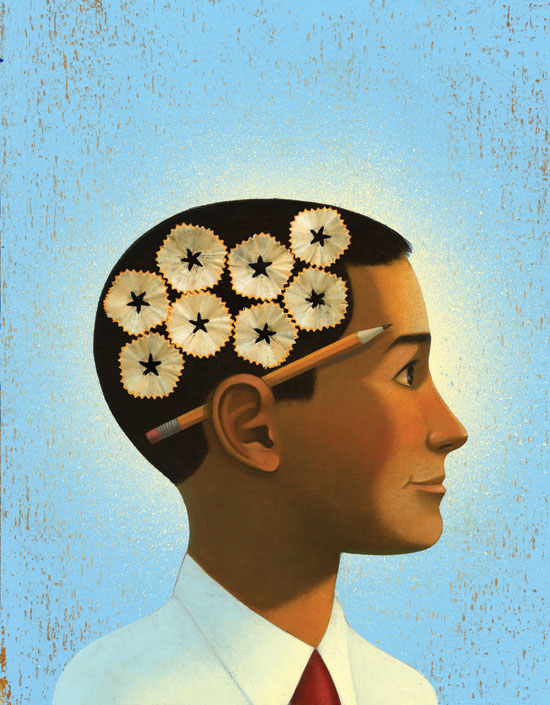Stress comes in many shapes and sizes for children.
For some, it’s a short-lived condition, such as when they change schools or are teased by peers. For others it’s ongoing, the result of something more serious: a chronic health condition, poverty or abuse. But no matter the cause or how long stress persists, it’s bad for the body and especially bad for the brain.
In children, chronic stress disrupts still-developing white matter—the coating of the intricate network of fibers and neurons that transmit messages between all the regions of the brain. This premature aging can take a toll on learning, memory and complex problem solving—skills children need to learn and thrive in school and manage stress. Children who live with chronic stress are prone to the crippling effects of depression and anxiety. When stress isn’t managed effectively, a host of physical and psychological ailments can result.
In a new study published by the high-impact journal Psychological Bulletin, Bruce Compas and his team evaluated data from more than 80,000 children and adolescents in 200 coping and emotional regulation studies to document the efficacy of various coping tools for children and families facing significant stress.
“Stress is the single most potent risk factor for mental health problems in children and adolescents, including depression, anxiety, post-traumatic stress syndrome, eating disorders and substance use,” says psychology professor Bruce Compas. “Children and families in crisis are particularly at risk, and what we found is that the use of coping and emotion-regulation strategies really do work and help mitigate the adverse effects of stress.”
“ … when children … used strategies such as cognitive reappraisal, acceptance, problem solving and assertive communication, they experienced lower levels of stress.”
—Graduate student Alexandra Bettis
The terms “coping” and “emotional regulation” refer to coping tools that fall under the umbrella of cognitive behavioral therapy, or CBT. Developed by Aaron Beck in the 1960s at the University of Pennsylvania, CBT is a clinical approach that focuses on managing the stream of negative thoughts people may experience. These “automatic thoughts” influence the way a person views themselves and the world and may lead to unhealthy behaviors and sick bodies. CBT is used in many settings to teach children how to manage a crisis and develop skills for ongoing stress management.
“Coping skills can be developed because the brain is malleable,” Compas explains. “Stress doesn’t kill cells the way chemotherapy does. Stress interferes with the way the brain connects and functions. The good news is that coping skills can be learned to curb the negative impact of stress on our lives.”
In the study, Compas and his team found that some children are less resilient to the effects of stress than others. They also found that not all ways of coping with crisis are effective or productive in the long run. For example, when children try to avoid their fears, the stress continues to negatively impact their bodies and their brains.
“What we found is that when children age 5–18 used strategies such as cognitive reappraisal, acceptance, problem solving and assertive communication, they experienced lower levels of stress,” says graduate student Alexandra Bettis, BA’10, MS’14. “On the flip side, those who used disengagement strategies like avoidance and denial had higher stress levels.”
“Stress doesn’t kill cells the way chemotherapy does.Stress interferes with the way the brain connects and functions.”
—Bruce Compas
These results echo the findings in Compas’ longitudinal depression study, which focuses on families who have a parent struggling with depression. Children in such families are at a high risk of becoming depressed themselves, which can lead to poor performance in the classroom and a host of other behavioral and emotional side effects. When children and parents were taught coping skills, they overcame their depression and were more likely to be depression-free two years later. One of those coping skills, Compas says, harkens back to the Serenity Prayer: accepting what you cannot change.
“The first skill we teach kids who have cancer or have a depressed mom is that you can’t ignore it. The first step is to acknowledge it and accept it,” he says. “Meanwhile, we are teaching Mom how to manage her stress or depression so she can parent and be present for her child.
“In the case of a parent of a sick child, parents need to manage their own stress so they can support their child. One way a parent may cope is to go into action mode: Seek information, be an advocate, and use problem-solving skills to find solutions. Another way is to use mindfulness practices like yoga and meditation.”
“We are not just wringing our hands, pointing out problems.We are trying to find solutions.”
—Bruce Compas
The research Compas is doing is all about finding solutions. Currently, he and his team are developing and testing the benefits of a novel online education program that will offer valuable coping tools to families who have a child with cancer. The project is funded by the Alex’s Lemonade Stand Foundation for Childhood Cancer.
“When a frightening diagnosis comes in, the families are reeling from the shock, and many are not able to meet with someone in person or as a family,” Compas says. “We are using all that we have learned about the power of coping skills to create something many families can benefit from and can be shared across conditions.”
The project is part of a three-year grant with the University of Washington and Nationwide Children’s Hospital researchers with expertise in pediatric oncology; stress, coping and family communication in pediatric cancer; internet interventions in pediatric populations; and family-focused interventions to build coping and parenting skills.
“I’m really proud of what we do,” Compas said. “We are a team that works together across disciplines with a common goal, and that is really special. We are not just wringing our hands, pointing out problems. We are trying to find solutions. For us, it’s all about trying to change people’s lives.”

